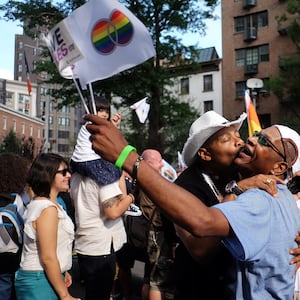In this special series, LGBT celebrities and public figures talk to Tim Teeman about the Stonewall Riots and their legacy—see more here.
Melissa Etheridge is a singer-songwriter, guitarist, and activist.
How and when did you first hear about the Stonewall Riots, and what did you make of them?
I grew up in Kansas, and didn’t hear about Stonewall until I moved to Boston (to attend Berklee College of Music) in 1979 when I was about 19 years old. I’d never been to New York City. When I heard about Stonewall, it was new information. “Wow, there are places where people can be gay and transgender.” Also, the information that we could get the crap beaten out of us if we were seen or known to be gay; and also the information, “Oh, these people stood up and rioted for us. This is getting serious here.”
At Berklee one of the women in one of the dorm rooms was out. I was gay but not going to tell anyone at the time. Sensing it, I think, she showed me an Advocate, which was a newspaper at the time. She explained the riots. It was a history lesson for this little baby dyke.
For her, it was kind of, “I know, it’s obvious what you are and let’s move on.” I came out six months later. Once you go, “Oh, this is me,” you just move ahead and do it.
What is the significance of the riots for you now?
They give us a point as the LGBTI community—all the letters—that you can see and say, “Oh, there was a time when we said ‘Stop!’ and we said ‘No!’ You don’t get to put us in the shadows and make us feel less-than and deviant. We will never ever go back to that.”
How far have LGBT people come in the last 50 years?
I have a wife (Linda Wallem) and four children (Bailey Jean, 22, Beckett, 20, and twins, Johnnie Rose and Miller Steven, 12). We have come way far. I have met presidents and traveled the world. I’ve been out for 25 years. There is so much more we need to do, but I also think we should take a moment and celebrate how far we have come.
I was surrounded by wonderful leaders and an amazing community of LGBT activists when I moved to Long Beach. I started playing women’s music festivals. I met some of the leaders from the 1970s. I was very inspired. When I got traction in my career, the whole community knew I was gay. I had been playing women’s bars.
When I came out (in 1993, at the LGBT Triangle Ball, celebrating President Bill Clinton’s first inauguration), I thought, “Look, I am part of this community. I’m not getting to be famous and not coming out.” Friends and colleagues like Urvashi Vaid and Kate Clinton—amazing people and activists—showed me how important it was.
The Trump administration is one of the first major backlashes that we have felt. Under Obama we got comfortable—the first time we saw the White House lit up in rainbow colors. Then the floor fell out, and wow. Now people are trying to undermine our marriages. I think how we handle this through our courts, through Mayor Pete running for president, all of these things, show we are still marching forward—and I think we’re doing a good job.
What would you like to see, LGBT-wise, in the next 50 years?
Fifty years from now, I would like it to be very quaint when people look back and say, “Oh, they had parades and stuff.” To my children’s children, LGBT will be just another color in the crayon box of all kinds of beautiful mixes. There won’t be separations an more, we will be all included.
A lot has happened in 10 years. The difference being a gay parent to my older ones and younger ones is that the first time around I was the only gay parent at school. Now, at my kids’ junior high, there are three or four of us. We’re part of the mix. We are still a minority, but it’s not crazy-rare. The kids at school are like, “two moms, OK, whatever.” It’s not a big deal.
If you could, what would you say to the Stonewall demonstrators?
Thank you for your bravery, thank you for being yourself, for following your inside knowledge even though it conflicted with everything outside. Thank you for blazing the path I walked on, and inspiring people and saving lives.


